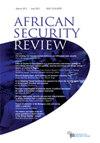Safety training deficiency, threats and adaptive measures among journalists reporting violent conflict in North East Nigeria
IF 1.1
Q3 INTERNATIONAL RELATIONS
引用次数: 1
Abstract
ABSTRACT This study appraises the mainstreaming and teaching of safety in journalism training institutions in Nigeria and interrogates the effectiveness of the safety measures available to safeguard the lives of journalists reporting from conflict areas in the North East geopolitical zone. In-depth interviews were conducted with 16 journalists representing a range of media organisations who had been reporting from the areas with the most volatile and prolonged conflicts. Mass communication curricula in universities and polytechnics across the region were also reviewed. The findings revealed that journalists in North East Nigeria are at high risk due to the absence of protective mechanisms and professional skills relating to safety. Journalists rely on their instincts and experience to manage risk, rendering them highly vulnerable in dangerous situations. These journalists endure multiple physical and psychological attacks from the security forces, insurgents and even community members that they cover. Recommendations reflective of best practice are offered regarding the mainstreaming of safety education in journalism training and the provision of safety mechanisms in order to reduce journalists’ physical harm and psychological trauma, increase their actual and perceived safety and security, boost their morale and improve the quality of their reporting.尼日利亚东北部报道暴力冲突的记者的安全培训不足、威胁和适应措施
摘要本研究评估了尼日利亚新闻培训机构的安全主流化和教学,并询问了可用于保护东北地缘政治区冲突地区记者生命安全的安全措施的有效性。对代表一系列媒体机构的16名记者进行了深入采访,这些记者一直在冲突最动荡和最旷日持久的地区进行报道。还审查了该地区各大学和理工学院的大众传播课程。调查结果显示,由于缺乏与安全相关的保护机制和专业技能,尼日利亚东北部的记者面临着高风险。记者依靠自己的直觉和经验来管理风险,使他们在危险情况下极易受到伤害。这些记者忍受着来自安全部队、叛乱分子甚至他们报道的社区成员的多次身体和心理攻击。提出了反映最佳做法的建议,将安全教育纳入新闻培训的主流,并提供安全机制,以减少记者的身体伤害和心理创伤,增加他们的实际和感知安全,鼓舞他们的士气,提高他们的报道质量。
本文章由计算机程序翻译,如有差异,请以英文原文为准。
求助全文
约1分钟内获得全文
求助全文

 求助内容:
求助内容: 应助结果提醒方式:
应助结果提醒方式:


